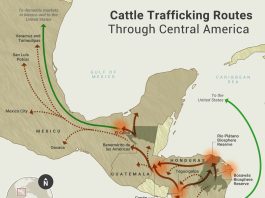This comes to On Pasture from Meg Belais, Restoration Project Manager & Analyst with The Freshwater Trust. The Freshwater Trust works with farmers and ranchers in the west to target and fund projects that create healthy rivers and streams and healthy and profitable working landscapes. You can learn more by visiting their website.

At 5:15 a.m. on July 30, 2017, a robo-call and email blast were sent to 50 irrigators and stakeholders in the Fifteenmile watershed.
The messages were not unsolicited spam; they were collaborative, proactive water management in action. The alert acted as The Freshwater Trust, farmers, state agencies and other nonprofits had all intended it to. It let the irrigators know that water temperatures downstream were rising, putting Fifteenmile Creek’s inhabitants in danger of being killed by high water temperatures. The irrigators sent more water their way, lives were saved, and the farmers were compensated for their participation.

This early warning system is the result of lessons learned some years back. 2009 was a blazing hot year. Oregon’s Fifteenmile watershed, which originates on the northeastern slopes of Mt. Hood and meets the Columbia River near The Dalles, was suffering as a consequence. That summer, extended high air temperatures and low flow in Fifteenmile Creek created a lethal combination, killing thousands of juvenile fish, including threatened winter steelhead. Under the Endangered Species Act (ESA), people can be held civilly and criminally liable for any activity that harms listed species. Thus, this event prompted enforcement officials from the National Oceanic and Atmospheric Administration to pay a visit to Fifteenmile Creek.
Local irrigators had two choices: Continue with “business-as-usual” and risk civil or criminal penalties if another fish kill occurred, or they could work together.
Collaboration won.
The Freshwater Trust, the Fifteenmile Watershed Council, and Wasco County Soil and Water Conservation District, as well as other stakeholders, worked with irrigators to prevent future fish kills and to reduce irrigator liability under the ESA.
The result? The Fifteenmile Action to Stabilize Temperatures, or “FAST,” an innovative system that puts information in the hands of the water managers.
Here’s how it works:
A temperature prediction model uses watershed data to produce a seven-day forecast of instream temperatures. When temperatures are predicted to hit levels lethal to fish, an alert is kicked into effect. Irrigators sign up in advance for one of two options.

In Option 1, they are required to turn off their diversion on days when an alert is in effect; however, they are provided compensation upfront. Option 2 provides more flexibility. In this option, irrigators choose whether or not to cease diverting water when an alert is in effect. This allows for flexible farm management, but the irrigator is compensated by the gallon for water left instream, and they would still be liable if a fish kill occurred while they were irrigating. When an alert is triggered, all Fifteenmile irrigators are informed via phone and email.
This past July, the FAST system was put into effect. The alert lasted for 14 days, which was the longest stretch to date. In total, 17 irrigators participated during this summer’s alert. This bypassed more than 1,000 gallons per minute and kept flows higher and temperatures lower in Fifteenmile Creek.
No kills have occurred in Fifteenmile Creek since the alert system has been in place. This is despite historically high temperatures and low flows, conditions that will likely be more common in coming years.

Ongoing support from individual donors to The Freshwater Trust, the Oregon Watershed Enhancement Board (OWEB), and the Columbia Basin Water Transactions Program (CBWTP) enabled The Freshwater Trust to work with multiple stakeholders in order to develop a solution that is balanced for different stakeholders and rooted in science.
FAST does not need regulatory agencies to operate. Instead, it provides real-time information to those with the power to make a difference for a precious resource.
We think this is a great solution! We’d love to hear your ideas about other ways folks can work together to solve these kinds of knotty problems.




